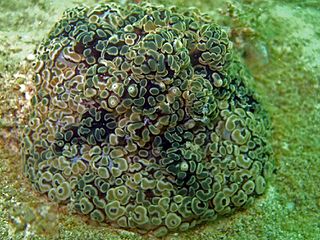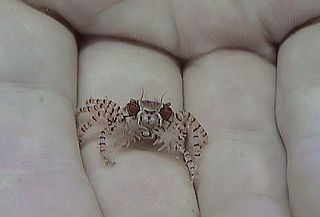 W
WAliciidae is a family of sea anemones, comprising the following genera:Alicia Johnson, 1861 Cradactis McMurrich, 1893 Lebrunia Duchassaing de Fonbressin & Michelotti, 1860 Phyllodiscus Kwietniewski, 1897 Triactis Klunzinger, 1877
 W
WAlicia is a genus of sea anemones in the family Aliciidae and contains the following species:Alicia beebei Carlgren, 1940 Alicia mirabilis Johnson, 1861 Alicia pretiosa (Dana, 1846) Alicia rhadina Haddon & Shackleton, 1893 Alicia sansibarensis Carlgren, 1900 Alicia uruguayensis Carlgren, 1927
 W
WAlicia mirabilis, commonly known as the berried anemone, is a species of sea anemone in the family Aliciidae. It changes shape as night falls expanding its column and tentacles to catch its food. It can be found in the Azores, Portugal, Spain and the Mediterranean and Red Seas.
 W
WAlicia pretiosa is a species of sea anemone in the family Aliciidae and can be found in the Red Sea and South Pacific Ocean.
 W
WAlicia rhadina is a species of sea anemone in the family Aliciidae. It is found in the Southern Ocean.
 W
WAlicia sansibarensis, commonly known as tuberculate night anemone, is a species of sea anemone in the family Aliciidae. It is found in the Indian and Pacific Oceans. Alicia sansibarensis have tentacles that are very long and snake, which are used for the protection of crownfish from predators.
 W
WLebrunia is a genus of sea anemones in the family Aliciidae.
 W
WLebrunia coralligens, commonly known as the hidden anemone, is a species of sea anemone in the family Aliciidae. It is found in shallow water in the Bahamas, the Caribbean, and Brazil. It lives in fissures in corals and rocks.
 W
WLebrunia neglecta is a species of sea anemone in the family Aliciidae. It is found in the Caribbean Sea and Gulf of Mexico.
 W
WPhyllodiscus is a monotypic genus of sea anemones in the family Aliciidae. The only species is Phyllodiscus semoni, commonly known as the night anemone, which is native to shallow seas in the central Indo-West Pacific, such as Indonesia, the Philippines and southern Japan. It is venomous and can cause a painful, long-lasting sting to humans. It is called unbachi-isoginchaku in Japanese which translates as "wasp-sea anemone".
 W
WTriactis is a genus of sea anemone in the family Aliciidae. It is monotypic, having only one species – Triactis producta. This is found in shallow waters in the Indo-Pacific where it lives on the seabed, rocks and corals. It derives much of its energy needs from the symbiotic algae it contains. It also forms a mutualistic relationship with small Lybia crabs.